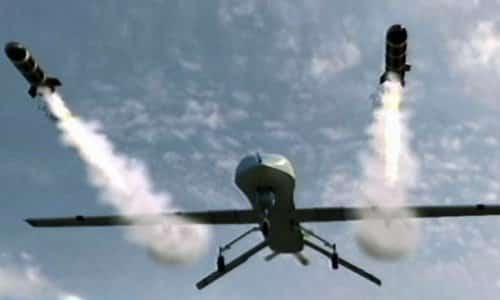Terrorist Drone Attack Inevitable?
 By PNW Staff May 23, 2016
Share this article:
By PNW Staff May 23, 2016
Share this article:
The power of drones was again demonstrated on Saturday after a US
drone targeted and killed the leader of the Taliban in Afghanistan. How
likely is it that Islamic militants will also seek to use similar
technology for their own purposes?
It doesn't seem that long ago that drones were regarded
as being incredibly high-tech, and prohibitively expensive. That's no
longer the case. Hobbyists race drones against one another through
obstacle courses, companies are developing drone delivery services,
we're using them to collect geographical data. Yesterday's shiny new
gadget is today's affordable toy.
Drones are
the sort of technology that we talk about "falling into the wrong
hands," and many experts are saying that a terrorist attack utilizing
drones is only a matter of time.
The
technology is becoming more affordable, more accessible, and more
flexible. The question is not so much how a terrorist might utilize a
drone in an attack, but why they haven't done so yet.
Peace
building organization PAX and ARES suggested that the appeal of drones
for armed forces has to do with the affordability and portability of a
drone system.
The cheapest models of hobby
drones are capable of running recon missions, while higher grade models
are an obvious choice for delivery and, potentially, explosives. A
hobby-grade drone with an explosive attached is effectively a guided
missile.
In Williamsport, Pennsylvania, a mock
attack was conducted during the Little League World Series in order to
gain some valuable intel on how a terrorist attack might play out.
The
drill used two drones to simulate a chemical attack, seeing fans
rushing to the exits in order to test how civilians and emergency
responders alike might handle such an attack.
A
report coming from the Oxford Research Group's Remote Control Project
titled The Hostile Use of Drones by Non-State Actors Against British
Targets suggests that drones will be used as a "simple, affordable"
airborne means of delivering explosives on targets.
We've
yet to see a large scale, successful drone attack by a non-state actor,
but the potential is there for even the less well-funded groups to
create a major ripple effect with strategic attacks. It's not difficult
to imagine a group using a few small drones to poison crops or jam radio
signals.
A suggested solution would be to classify drones in a manner similar to how we currently classify firearms.
As
the line between military and hobbyist grade drones blurs, waiting
periods and background checks may be enormously helpful in ensuring that
criminals and domestic terrorists have a difficult time obtaining
drones for use in attacks. GPS tracking and possibly override systems
may also be of use in thwarting would-be terrorists.
We have seen a number of unauthorized drone flights that hint at what a hostile group might be able to do with a drone.
An
anti-nuclear activist in Japan landed a drone containing radioactive
sand on the prime minister's office early last year, an Albanian
activist disrupted a football match against Serbia by flying the
Albanian flag over the game, and Hezbollah violated Israeli airspace
with drones.
Although the explosives carried by a single
consumer-grade drone might not seem capable of doing that much damage,
drones have been shown to be able to fly in formation, with one pilot
leading a fleet of dozens, even hundreds of networked drones. In theory,
a single person could launch an attack as destructive as a US missile
strike.
In all likelihood, terrorist groups
have already been hard at work training their foot soldiers in the
operation of drones, how and where to obtain them, how to equip them for
hostile acts, and how to pilot them as such to limit the risk of
detection before the attack can be successfully completed.
In short: the first major terrorist attack utilizing drones is probably already in the development stages.
To
put greater emphasis on background checks and so on right now will help
to stop further drones from being put out into the wrong hands, but
there are already thousands of consumer-grade drones going from
owner-to-owner, without any sort of paper trail.
To
wipe out every consumer grade drone on the face of the Earth right now
would not stop terrorists from 3D printing the parts to create their
own. Furthermore, a black market in drones is certain to develop, just
as it now exists for other weaponry. This reality, alone, makes the idea
of waiting periods and background checks almost laughable.
Simply
put: Terrorists will be using drones in future attacks, and there isn't
any way to stop that. However, through preparation, this risk may be
manageable.
By training emergency responders,
law enforcement and military professionals in how properly to address
this threat, drones need not be a major advantage for hostile non-state
groups of militant extremists.

No comments:
Post a Comment